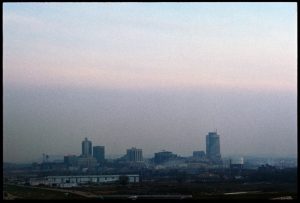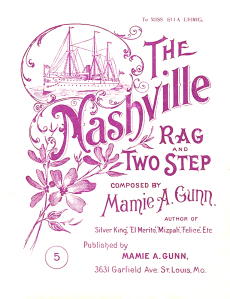by Jochen Markhorst
II Some of the names just didn’t seem to fit
 On 9 April 2019, the trustees of the Al Clayton Photography estate post on social media the photo that graces the back cover of Nashville Skyline. With explanatory text:
On 9 April 2019, the trustees of the Al Clayton Photography estate post on social media the photo that graces the back cover of Nashville Skyline. With explanatory text:
“50 years ago today the Nashville Skyline album was released. Al shot the back cover. Story: Al had heard Dylan wanted a certain “look” for the back cover. We have recently discovered all of the slides he shot while searching for “the” image. […]. When Al saw this one, he went to Johnny Cash’s home. There was a party going on. Dylan was there. Al walked up and placed this picture on the table and asked “Is this what you’re looking for?” The rest is history.”
Interesting enough, but it still leaves plenty of question marks. Clayton selects one of his photographs, in the apparent belief that this is “the certain look” Dylan is looking for – the famous photo with the Nashville skyline. Which suggests that Clayton already knew the album’s title. Which in turn suggests that the album was named after the song “Nashville Skyline Rag” (and not the other way around).
Dylan’s own statements about the title choice don’t clarify much either, but they do clarify something. In the lengthy 1969 Rolling Stone interview, Jann Wenner explicitly asks about it, shortly after Dylan reveals that an initial title was John Wesley Harding, Volume II, and that the record company wanted to call the LP Love Is All There Is. Which is killed by Dylan with the enigmatic, self-contradictory argument, “I didn’t see anything wrong with it, but it sounded a little spooky to me.” Yes, but where then did the final title Nashville Skyline come from, Wenner wants to know;
“Well, I always like to tie the name of the album in with some song. Or if not some song, some kind of general feeling. I think that just about fit because it was less in the way, and less specific than any of the other ones there. Certainly couldn’t call the album Lay Lady Lay. I wouldn’t have wanted to call it that, although that name was brought up. It didn’t get my vote, but it was brought up. Peggy Day – Lay Peggy Day, that was brought up. A lot of things were brought up. Tonight I’ll Be Staying Here With Peggy Day. That’s another one. Some of the names just didn’t seem to fit. Girl From The North Country. That was another title which didn’t really seem to fit. Picture me on the front holding a guitar and Girl From The North Country printed on top. [laughs] Tell Me That It Isn’t Peggy Day. I don’t know who thought of that one.”
It really looks like Dylan is sucking the second part out of his thumb on the spot here. At least, it seems very unlikely that all those Peggy Day variations were actually serious proposals. The first part of his answer, though, “I always like to tie the name of the album in with some song. Or if not some song, some kind of general feeling”, sounds very plausible. After the corniness of the trite, embarrassing album title Another Side Of Bob Dylan, so from Bringing It All Back Home onwards, Dylan reserves the right to name his own LPs. And indeed, the four albums since then do express a “general feeling”, or are “tied in with some song”, and in half the cases both at the same time (Highway 61 Revisited and John Wesley Harding). Just as Nashville Skyline both is “tied in with a song” and expressing a “general feeling”.
Fine choice of title, then. Which Dylan unfortunately undercuts a bit himself with the continuation of his motivation: “It was less in the way” – more or less dismissing the motivation for choosing Nashville Skyline as: the least bad of even worse options. Incidentally, he is of course right to disqualify candidate album titles like Lay Peggy Day or Girl From The North Country as “awkward, in the way”. But surely Nashville Skyline is an excellent, apt, original title. Better at least than other extremes like Planet Waves and Empire Burlesque, to name just two – after all, Dylan misses as often as he hits the mark, with his album titles.
The most likely scenario, all things considered, is that on Monday afternoon, 17 February 1969, producer Johnston asks: “What do you want to call it?” after recording the instrumental they had just improvised. He needs some title for the recording sheet. The inimitable Norman Blake just turned those few chords and “that little melody” into a splashy rag.
“Nashville Rag?” Dylan tries, not too imaginatively. “Already exists,” ragtime expert Norman Blake will presumably object (and he’s right; “Nashville Rag” was written by legendary female ragtime pioneer Mamie Gunn back in 1899). “Just make it Nashville Skyline Rag then,” says Dylan, after taking a quick glance outside, meanwhile trying to think of how the chords of the next song, “Tonight I’ll Be Staying Here With You”, went.
To be continued. Next up Nashville Skyline Rag part 3: The long-haired hippies and their drugs
Jochen is a regular reviewer of Dylan’s work on Untold. His books, in English, Dutch and German, are available via Amazon both in paperback and on Kindle:
- Blood on the Tracks: Dylan’s Masterpiece in Blue
- Blonde On Blonde: Bob Dylan’s mercurial masterpiece
- Where Are You Tonight? Bob Dylan’s hushed-up classic from 1978
- Desolation Row: Bob Dylan’s poetic letter from 1965
- Basement Tapes: Bob Dylan’s Summer of 1967
- Mississippi: Bob Dylan’s midlife masterpiece
- Bob Dylan’s Greatest Hits
- John Wesley Harding: Bob Dylan meets Kafka in Nashville
- Tombstone Blues b/w Jet Pilot: Dylan’s lookin’ for the fuse
- Street-Legal: Bob Dylan’s unpolished gem from 1978
- Bringing It All Back Home: Bob Dylan’s 2nd Big Bang
- Time Out Of Mind: The Rising of an Old Master
- Crossing The Rubicon: Dylan’s latter-day classic
- Nashville Skyline: Bob Dylan’s other type of music

I believe that Dylan wanted to call Planet Waves Ceremonies of the Horsemen and Columbia vetoed it in favour of the more goovy Planet Waves. Maybe Dylan didn’t always have full control over album titles.
That’s a story I don’t know, Mike. However, the consensus seems to be that Dylan himself wanted to change the title to “Planet Waves” at the last minute.
By the way, Columbia has nothing to do with it; this is one of two albums not released by Columbia (I have the Island Records release).